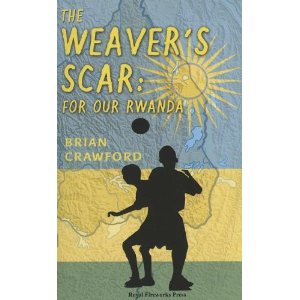This year marks the twentieth anniversary of the genocide in Rwanda, which claimed the lives of up to a million Tutsis and moderate Hutus. The massacre revealed the helplessness of international organizations and spurred the establishment of the International Criminal Court to prosecute crimes against humanity in the absence of governmental authorities willing and able to do so.
 Despite the significance of the genocide and high-profile films such as Hotel Rwanda, very few books for young people portray this event. Elisabeth Combres’s Broken Memory (Groundwood, 2011) is the award-winning story of a 14-year-old Tutsi girl who, having survived the genocide nine years earlier, must confront her nightmares to help bring some of the perpetrators to justice. But an event of this magnitude deserves more than one story, and Brian Crawford’s The Weaver’s Scar (Royal Fireworks Press, 2013) complements Combres’s book well, as it portrays a teenage boy’s survival journey at the time of the genocide.
Despite the significance of the genocide and high-profile films such as Hotel Rwanda, very few books for young people portray this event. Elisabeth Combres’s Broken Memory (Groundwood, 2011) is the award-winning story of a 14-year-old Tutsi girl who, having survived the genocide nine years earlier, must confront her nightmares to help bring some of the perpetrators to justice. But an event of this magnitude deserves more than one story, and Brian Crawford’s The Weaver’s Scar (Royal Fireworks Press, 2013) complements Combres’s book well, as it portrays a teenage boy’s survival journey at the time of the genocide.
Fourteen-year-old Faustin lives with his parents and older brother in a multiethnic rural village, far, they believe, from the trouble brewing in the capital of Kigali. However, a teacher seems to dislike Faustin, one of the school’s few Tutsi students, for no reason. Faustin father won’t tell him the truth about a leg injury sustained many years ago, but he also won’t let Faustin play with Déo, a soccer teammate who is Hutu. More ominously, Faustin’s brother blasts the radio, which intersperses popular music with increasingly hateful anti-Tutsi rhetoric.
When the president’s plane is shot down in Kigali, the genocide begins. Faustin finds himself on the run—and an unexpected ally who is also fleeing a bad situation. Crawford presents the events leading up to and during the genocide while creating a gripping story of adventure and survival. The Weaver’s Scar will appeal especially to boys and reluctant readers, with a perfect balance of social and historical context on one hand and a tale of two unlikely friends trying to escape a wave of violence they barely understand on the other.
There is a tendency for mainstream publishers to assume that young readers don’t want to read stories set in other countries or with main characters whose lives are different from theirs (which begs the question of why fantasy and science fiction are such popular genres). As a result, this worthwhile and gripping story has come out with small publisher Royal Fireworks Press, which specializes in books for homeschoolers, and it has not gotten the review attention it deserves. The Weaver’s Scar has a lot of meat, and I think we sell young readers short when we assume they will not want to read this kind of book. We also do young readers a disservice when we fill their shelves with more of the same and exclude stories that open their eyes to what’s going on in their world today. The Rwandan Genocide belied the post-Holocaust statement of “never again,” and keeping our young people ignorant is going to mean that more “never agains” happen again.
2 comments for “Fleeing Genocide: A Review of The Weaver’s Scar”